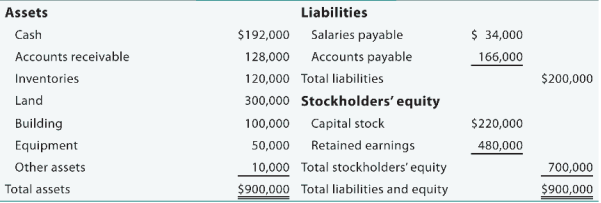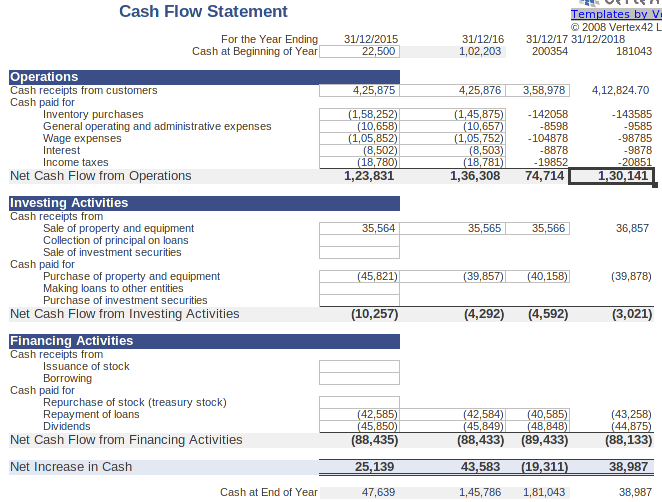INTRODUCTION
Small businesses refer to privately owned firms that have less annual revenue and fewer employees than regular-sized corporations. These organisations play a vital role in the economic growth and development of the country. A copious amount of effort and time is required to run a business successfully. Owners of firm are responsible for managing all aspects and need to use a combination of knowledge, expertise and education to run their enterprise (Gandy, 2015). In the present assignment, the chosen organisation is AZIO Corporation which is an electronic keyboard manufacturer in the United Kingdom. This report discusses how small businesses plan and allocate resources to attain objectives and evaluate the customer relationship management process. It also includes analysis of cash flow forecast, break-even point, budget and interpretation of key financial statements. Finally, the implication of legislation and regulations on small businesses is defined in this project.

TASK 1
P1: Main Considerations a Small Business Needs to Address When Planning and Allocating Resources to Attain Business Objectives
Small businesses are privately owned enterprises that employ less manpower and have less volume of sales. Their budget is generally low, so it is crucial for them to consider all the key factors at the time of planning and resource allocation. This assists the firm in attaining its business objectives in an effective manner. Below are the main considerations that AZIO Corporation needs to address while planning and allocating resources. These include:
Vision and Mission:
Vision: This statement states what the firm wants to accomplish in the long term. The vision of AZIO Corporation is “to be a market leader in the manufacturing and distribution of electronic keyboards.”.
Mission: It defines the purpose or goals of the company. The mission statement of AZIO Corporation is “to maintain a large customer base and satisfy them by providing high-quality electronic keyboards to customers.”.
Vision and mission statements are considered blueprints, which define the actions to be performed by the company (Burns, 2016). So, these require to be considered by the firm when planning and allocating resources.
Objectives:
Objectives refer to the basic tools or ways that underlie all strategic and planning activities. When planning and allocating resources, it is very essential for the manager of AZIO Corporation to consider the main objectives of the firm so that these can be attained successfully. On the basis of the firm's objectives, managers are required to formulate and implement appropriate strategies accordingly so that business objectives can be attained.
Skills and expertise of manpower:
The strengths and abilities of employees are essential factors that require being considered by the manager of AZIO Corporation before the allocation of resources. So, the determination of manpower's abilities is necessary for assigning resources appropriately as per the skills and abilities of individuals. It assists in bringing effectiveness to business processes and ensures the optimum utilization of resources. A skilled workforce provides a competitive edge to the firm in the market and helps in attaining business goals and objectives effectively.
Financial resources:
Finance is the main resource that is required for managing and running business operations smoothly. It is very crucial in performing day-to-day activities and functions of the firm. So, the manager of AZIO Corporation is required to ensure the availability of adequate funds within the company for performing and running business operations successfully (Crane and Matten, 2016). They should interpret all financial statements and formulate a budget accordingly. It assists a firm in determining fund availability and required capital in performing a specific task.
Above mentioned are the factors that need to be considered by the manager of AZIO Corporation while planning and allocating resources in order to attain business objectives effectively.
TASK 2
P2 Evaluation of Different Processes of Customer Relationship Management for a Small Business
Customer relationship management refers to the approach that is used to manage the company's interaction with current as well as potential customers (What is CRM? 2018). Under this approach, the company collects information about customers, which further helps in improving the business relationship with its customers. AZIO Corporation focuses on the management of distinct resources and administration of their consumer relations for better performance of the organisation. The following process can be followed by AZIO Corporation to execute the customer relationship management approach:
Set a target: First of all, AZIO corporation is required to set targets regarding the number of customers to be approached. After setting up the objectives to be achieved, the next step is to formulate an action plan to be executed in order to achieve set targets. This action plan will define all the task and activities to be performed during the execution of its CRM program.
Prioritize customers: After setting up targets, the next step is to prioritize customers on the basis of their profitability (Legg et. al., 2015). So, AZIO Corporation must choose its target customers so that all the CRM efforts can be done in the context of developing a strong relationship.
Communicate with employees: After deciding the customers to target, the next step is to communicate their CRM strategies with employees. This helps AZIO corporation improve its strategies before applying them to a targeted audience. These strategies further assist in providing the directions that provide better results.
Track customers:- When strategies and plans are being set up, the next step is to track the targeted audience. Under this step, the company tracks its customer who uses keyboards on a regular basis in order to collect information regarding their taste, needs and preferences (Steingold, 2017).
Assess the information collected: Under this step, the information collected from the target market is evaluated in order to identify the expectations of customers toward the company. This evaluation also assists in identifying the factors that must be considered by AZIO Corporation while serving its customers to improve relationships.
Continual improvement in relationships: The final step includes a continual adjustment in the CRM process in order to improve customer relationships in the long run. Under this step, AZIO corporation can take regular feedback from its targeted audience in order to identify their performance. Using this company can also evaluate the progress of its CRM program and introduce improvements in its current program for the betterment of future relationships.
The above-explained steps of the customer relationship program will help AZIO Corporation develop better strategies in order to establish a long-term relationship between customers and organisations. This further assists the company in retaining customers, which in turn will provide better growth opportunities and will also support in achieving a competitive edge over other rivals in market.

Stuck with your Assignment?
Hire our PROFESSIONAL ASSIGNMENT WRITERS and Get 100% Original Document on any Topic to Secure A+ Grade
Get Assignment Help
P3: Transnational Development of Small Business and Its Benefits and Drawbacks
Transnational business strategy is utilized when a firm decides to perform its business operations internationally. These firms tend to be headquartered in the parent nation and their subsidiaries in another country (Epstein, 2018). By evaluating market opportunities and potentiality, small enterprises can start their subsidiaries in another nation. Transnational activities assist the company in its growth, as providing goods to new customers helps in yielding high revenues. By establishing a network with electronic retailers in different regions of countries, AZIO Corporation can develop its business transnationally. It can set up its subsidiaries in distinct nations to provide its electronic keyboards that can respond to the business environment, culture, laws, and needs of the nation.
Benefits of transnational business development:
Broader market base:
AZIO Corporation can get the opportunity to offer its products on a global scale by setting up its subsidiaries in distinct regions or nations. Access to more customers will assist a firm in yielding maximum revenue.
Brand recognition:
High brand recognition can be achieved by AZIO Corporation through performing its operations transnationally. It supports firms in maximizing growth prospects in different marketplaces and generating high revenues (Spence, 2016).
Tax benefit:
Transnationally operated firms get tax benefits associated with import-export transactions in other nations. The government provides tax rebates to draw the attention of international investors to operate a business in their country.
Drawbacks of transnational business development:
Risk of failure:
The legal and political requirements of each country are different and if the firm does not meet it appropriately, then it may lead the company towards failure in performing business operations. Besides this, the cultural norms of each country are also distinct so AZIO Corporation needs to manage these properly, as failure may result in heavy loss due to reduced demand for the company's product.
Expensive:
The biggest disadvantage of setting up a business transnationally is its expensive nature and being difficult to establish. It involves numerous costs like getting permit, acquiring facilities, etc. which are beyond the range of small enterprises (R. Anderson and Ullah, 2014).
TASK 3
P4 Annual itemised monthly cash flow forecast depicting variable and fixed costs set against the income of the organisation
The cash flow statement, balance sheet, and P&L of AZIO Corporation are as follows:
Balance Sheet:
|
Year |
2017 (value in £) |
2018 (value in £) |
|
Fixed assets |
130 |
210 |
|
Stock |
20 |
35 |
|
Debtors |
70 |
55 |
|
Bank |
20 |
30 |
|
Total |
240 |
330 |
|
Creditors |
120 |
180 |
|
Bank overdraft |
90 |
70 |
|
Total |
210 |
300 |
|
Working capital |
30 |
80 |
Profit and Loss Account at the year ended
|
2017 |
2018 |
|
|
Sales |
20 |
30 |
|
Cost of sales |
10 |
15 |
|
Gross profit |
30 |
45 |
|
Overheads |
6 |
7 |
|
Net. profit |
24 |
38 |
Cash flow statement:

P5 Application of Break-Even Analysis to an Organisational Situation
Break-even analysis is defined as an approach that is widely used by management accountants and production management. It is a useful tool that helps in determining at what point a new product or company will be profitable. A comparison of total fixed and variable costs is done with sales revenue to determine the sales volume level, the sales value at which the business attains the state of neither profit nor loss (Trevino and Nelson, 2016). Analysing price levels linked with different demands, break-even analysis is used by the company in order to evaluate how much volume of sales is needed to cover total fixed cost. It is the point that depicts the stage at which AZIO Corporation gains no profit and bears no loss. The break-even point is the point where the total cost and revenue of the firm are equal, that is, the firm attains the state of no profit and no loss. It is the calculation of a point where revenues are equal to expenses. Generally, this analysis is done by AZIO Corporation in order to calculate the point where revenues start to exceed costs. It assists the owner of the firm in identifying when they will begin to convert profit and helps in pricing their product. It gives a dynamic overview of the interrelationship among costs, profits and revenues. Determination of the break-even point helps the manager of AZIO Corporation in identifying an aggregate number of units that the firm sold. It provides direction to managers in making various decisions regarding developing the financial performance of the company. Sales have a direct impact on the activities of the business, as higher sales depict the situation of profitability, whereas low sales state about the condition of loss. The organisation mainly focuses on attaining high growth and long-term success in the market by improving its activities and operations in an effective and efficient manner (Kitching, Hart and Wilson, 2015).
AZIO Corporation is an electronic keyboard manufacturer that is concerned about improving its sales and profits by producing high-quality products that effectively satisfy the needs and requirements of customers. Managers make various efforts to increase sales of the company so that it can get more benefits, attain a high position and maintain its sustainability in the marketplace for a longer period of time. The main obligation of the administrator is to analyse financial data that is collected by various sources to forecast product demand. It assists the manager at the time of budget formulation. The company made several efforts to cross-break even so that high profits could be yielded and ensure its long-term survival in the market. This analysis also assists the manager of AZIO Corporation in minimizing waste and eliminating extra expenses that bring efficiency to the activities of the company. The calculation of the break-even point can be understood by the below-mentioned example.
For instance: If the company's fixed cost is 20,000 and the variable cost per unit is 10. Its selling price is 15. In this situation, break-even point calculation can be done by using the below-defined formula.
BEP: Fixed cost/construction margin per unit or product
= 20000/(15-10) = 4000.
P6 Interpretation of Key Financial Statements in Relation to Their Contribution to the Successful Management of an Organisation
Financial statements refer to the written records regarding the financial position and activities of a business or other entity (Glover and Kusterer, 2016). These are further utilized by managers of business enterprises in formulating strategies that are implemented by the firm in its future course of action. Financial reports are utilized to determine the liquidity, financial strength and performance of an organisation. Some financial statements which contribute to the successful management of the business of AZIO Corporation are defined below:
Balance sheet: It is the statement that assists in identifying the financial position of the company by representing the liabilities, owner's equity and assets over a particular time period. It helps in tracking the earnings and spending that is incurred by a firm in its whole financial year. The Balance Sheet is the essential document that keeps informed the business owner about the financial position of the enterprise (Moir, 2014). It helps current as well as potential investors get a clear understanding regarding where they should invest their money and how much return they can expect in upcoming years. AZIO Corporation can determine their financial position by preparing a balance sheet and with the help of this, they can attract investors to invest their money in it.
The balance sheet of the company

Profit and loss account: This financial statement depicts the cost, revenues and expenses incurred by the firm during a particular time period. It shows how much profit a company made in a given period. After deducting all expenditures from income, the net profit and loss that the firm has made is defined in this statement.

Cash flow statements: This financial statement depicts the aggregate information related to cash inflows that the firm receives from its investment as well as business operations. Cash outflows are also depicted in this statement that are paid by business enterprises at the time of performing their activities and operations within the period. The cash flow statement assists AZIO Corporation in knowing whether the firm is able to recover its expenses or not (Trevino and Nelson, 2016).

TASK 4
P7 Key Legislation and Regulations That Impact Small Businesses
Small businesses highly contribute to the development and growth of a country. These are considered as change agents, which helps in bringing innovation and facilitate the economic development of the country. By imposing some taxes as well as regulatory measures, the government also supports managing business operations. Its main purpose is to enhance the technological and economic environment for small enterprises by supporting their establishment, survival and growth in a competitive market. But excessive implications of legislation and regulations are the major barrier to the survival and growth of businesses. Small firms are less proficient in dealing with regulation complexities and are unable to incur funds on compliances across operations of large scale (Deresky, 2017). There are various legislations and regulations that impact the activities and operations of business. So, in order to perform business operations effectively and smoothly, some legislations is required to be followed by AZIO Corporation, which is defined below:
Employment law: This legislation governs the relationship between manpower and employer by shaping their duties or rights. As per this law, the firm is required to treat every employee in an equal and fair manner. This law is framed for keeping the workforce safe and treating them fairly without any discrimination. Employment law involves several regulations related to working conditions, health and safety, fair compensation and rights of an employee, etc. AZIO Corporation should implement this legislation at the workplace while performing its operations so that legal compliances can be eliminated (R. Anderson and Ullah, 2014).
Labour's compensation: According to this law, it is very essential for firm to give equal or fair compensation to each employee who works within the organisation at the same level. They are required to provide appropriate compensation to them so that they do not feel discriminated against. Employers must ensure that their employees are not discriminated on the basis of income, age, gender, religion, etc. AZIO Corporation limited must comply with this legislation, as ignorance of it may impact the goodwill and image of the company. Therefore, it is very essential for firms to provide fair remunerations to the workforce without any discrimination.
Healthy & safety law: As per this law, the firm must ensure the safety of manpower, customers, etc. It will help them eliminate accidents that may occur at the workplace and harm any individual. AZIO Corporation must implement health and safety laws within the organisation and provide safety measures to their workers so that the chances of accidents can be reduced. They should provide proper training to employees so that they are able to handle and work with machinery effectively (Schaper et. al., 2014). It assists in making their employees feel secure at the workplace, which in turn results in increasing productivity and they encourage them to work towards the attainment of organisational goals.
CONCLUSION
As per the above-mentioned report, it has been concluded that a small business organisation must consider various factors such as financial resources, mission & vision, as well as skills of employees, before performing its business operations and allocating resources. These factors help the company achieve its goals and objectives. Apart from this, for achieving market sustainability, it is very essential for a small business firm to establish a better customer relationship. For performing transnational operations, the firm must follow various laws such as employment law, labour compensation law, health & safety law, etc. while performing its business operations.
To get online help with your Business Assignments, contact Assignment Desk, the best assignment writing service provider in the UK.
REFERENCES
Burns, P., 2016. Entrepreneurship and small business. Palgrave Macmillan Limited.
Crane, A., and Matten, D., 2016. Business ethics: managing corporate citizenship and sustainability in the age of globalization. Oxford University Press.
Deresky, H., 2017. International management: Managing across borders and cultures. Pearson Education India.
Epstein, M. J., 2018. Making sustainability work: Best practices in managing and measuring corporate social, environmental, and economic impacts. Routledge.
Glover, D., and Kusterer, K., 2016. Small farmers, big business: contract farming and rural development. Springer.
Gandy, D. L., 2015. Small business strategies for company profitability and sustainability.
Kitching, J., Hart, M., and Wilson, N., 2015. Burden or benefit? Regulation as a dynamic influence on small business performance. International Small Business Journal. 33(2). pp. 130-147.
Legg, S. J., and et. al., 2015. Managing safety in small and medium enterprises.
Moir, L., 2014. Managing corporate liquidity. Routledge.



 Company
Company


















